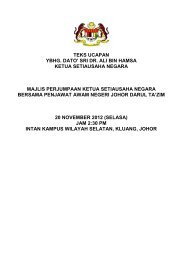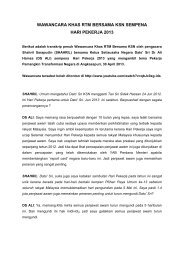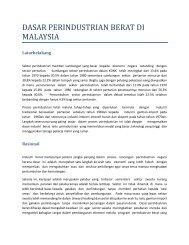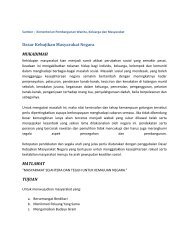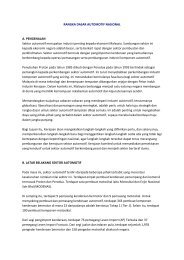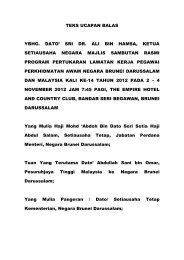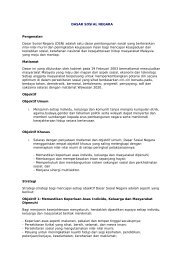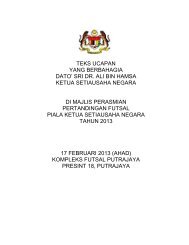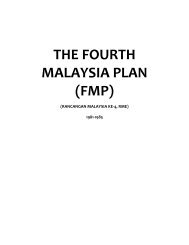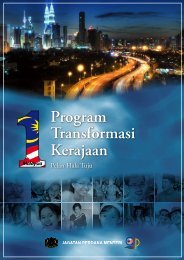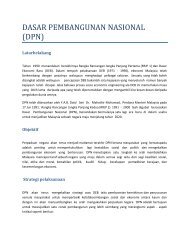GTP 2.0 - Prime Minister's Office of Malaysia
GTP 2.0 - Prime Minister's Office of Malaysia
GTP 2.0 - Prime Minister's Office of Malaysia
You also want an ePaper? Increase the reach of your titles
YUMPU automatically turns print PDFs into web optimized ePapers that Google loves.
alex mourmouras<br />
Chief, D5 Division, Asia and Pacific Department<br />
International monetary Fund<br />
Dr Alex Mourmouras has served in four IMF<br />
departments for over 19 years, in operational<br />
positions and as a leader <strong>of</strong> IMF training<br />
programs. As chief <strong>of</strong> the D5 division in the Asia<br />
and Pacific Department, he leads the work <strong>of</strong> the<br />
ASEAN division responsible for Brunei, Indonesia,<br />
<strong>Malaysia</strong>, Philippines, and Singapore. He is also<br />
the mission chief for <strong>Malaysia</strong>. Previously, he<br />
served as division chief in the European and<br />
Middle Eastern Division <strong>of</strong> the IMF Institute<br />
for Capacity Development, and as chief <strong>of</strong> the<br />
European Division in the IMF Institute.<br />
In 2007, Dr Mourmouras served as Acting<br />
Director and Chief Training Economist <strong>of</strong> the<br />
Joint Africa Institute. From 1999 to 2003, he was<br />
economist and senior economist in the IMF’s<br />
Policy Development and Review Department<br />
(PDR), contributing to a comprehensive review<br />
<strong>of</strong> IMF conditionality, the revamping <strong>of</strong> the<br />
IMF’s debt sustainability framework, and the<br />
formulation <strong>of</strong> policies to prevent and deal with<br />
misreporting <strong>of</strong> information to the IMF.<br />
Prior to joining the IMF, Dr Mourmouras<br />
held the position <strong>of</strong> Associate Pr<strong>of</strong>essor <strong>of</strong><br />
Economics and Director <strong>of</strong> Graduate Studies<br />
at the University <strong>of</strong> Cincinnati. He has also<br />
held academic positions at other universities.<br />
He obtained a Bachelor’s degree in Applied<br />
Mathematics from Harvard College and a PhD in<br />
Economics from the University <strong>of</strong> Minnesota.<br />
Dr Ravi balakrishnan<br />
Resident Representative<br />
International monetary Fund<br />
Dr. Ravi Balakrishnan is currently the IMF<br />
Resident Representative with regional<br />
responsibilities based in Singapore. He started<br />
his career at the Bank <strong>of</strong> England and Bank <strong>of</strong><br />
Spain before joining the IMF in 2001. Since<br />
then, he has worked on various countries across<br />
regions and income thresholds including Bolivia<br />
and the United States, and was also part <strong>of</strong> the<br />
team that produced the IMF’s World Economic<br />
Outlook before taking up his current position. As<br />
Resident Representative, he has been actively<br />
involved in the Fund’s work on <strong>Malaysia</strong> and<br />
Singapore, on capital flows to the region, and on<br />
inclusive growth. Dr. Balakrishnan has published<br />
various research papers (related to labour<br />
markets, inflation dynamics, exchange rates and<br />
capital flows) in well-known journals. He holds<br />
a PhD and MSc in Economics from the London<br />
School <strong>of</strong> Economics (LSE) and a BA Honours<br />
from Churchill College, Cambridge University.<br />
FINdINGS OF THE 2012<br />
IPR PaNEl ON THE <strong>GTP</strong><br />
On the basis <strong>of</strong> the information provided by PEMANDU and<br />
PWC’s review <strong>of</strong> the data, the Panel noted that the <strong>GTP</strong> was<br />
“still very relevant and still very vibrant”. The Panel agreed<br />
that the results achieved by the <strong>GTP</strong> have been impressive, but<br />
suggested that it may be time for the Government to re-evaluate<br />
the goals <strong>of</strong> the programme.<br />
“After three years <strong>of</strong> work, it may be time to<br />
take a step back and review the objectives (<strong>of</strong><br />
the transformation programme),” said Michael<br />
Hershman, who has been an IPR Panel member<br />
since the start <strong>of</strong> the <strong>GTP</strong>.<br />
“It may be time to ask yourselves whether<br />
your final objectives are too modest. For<br />
example, should you still be looking at raising<br />
GNI per capita to US$15,000 by 2020, or<br />
should it be done sooner than that?<br />
“We are urging PEMANDU to take a broader<br />
look at what the Government can really<br />
accomplish over the course <strong>of</strong> the next seven<br />
years.” In particular, the Panel has in mind taking<br />
stock <strong>of</strong> the experience <strong>of</strong> the first three years<br />
and identifying which programs are cost effective<br />
and which ones need to be reshaped.<br />
Specifically, it would be desirable in the next<br />
round to look at the entire package <strong>of</strong> measures<br />
in the <strong>GTP</strong> and ETP in terms <strong>of</strong> effectiveness<br />
and efficiency in addressing poverty and equity.<br />
This would include examining the various<br />
subsidy programs, the cost <strong>of</strong> living NKRA, rural<br />
development and the special programs under<br />
the SRI inequity objectives. The cost <strong>of</strong> living<br />
program is one that should be looked at closely<br />
as the Panel retains the concerns voiced last year<br />
regarding its contribution to a transformation<br />
program given that it seems aimed at dealing<br />
with short-term pressures.<br />
Other suggestions from the Panel looked at<br />
addressing qualitative issues, namely:<br />
embedding the <strong>GTP</strong> culture into the civil<br />
service so that responsibility can be<br />
progressively transferred from PEMANDU,<br />
hence helping ensure that the <strong>GTP</strong><br />
achievements and processes are made<br />
sustainable;<br />
increasing the emphasis on underlying<br />
structural reforms, qualitative assessments<br />
and perceptions feedback from the public<br />
<strong>of</strong> the <strong>GTP</strong> rather than simply focus on<br />
196 Government transformation Programme—Annual Report 2012 IPR 197<br />
Government transformation Programme—Annual Report 2012 IPR<br />
NKPIs; and<br />
reducing the complexity <strong>of</strong> reporting results,<br />
focusing on the main KPIs which illustrate<br />
transformation progress (e.g. reductions<br />
in reported crime, increases in the modal<br />
share <strong>of</strong> public transportation), and to better<br />
align reported numbers with the national<br />
accounts data.<br />
<strong>Malaysia</strong>’s <strong>GTP</strong>, Hershman added, had<br />
distinguished itself from other transformation<br />
programmes the Panel had observed elsewhere<br />
in the world, particularly through its use modern<br />
technology throughout its initiatives.<br />
“The focus <strong>of</strong> our inquiries and our sessions<br />
the last few days in part was to see if the best<br />
<strong>of</strong> government practices and private industry<br />
practices were applied to the <strong>GTP</strong> (and) we<br />
found not only the use <strong>of</strong> data and technology<br />
combined with an ethical base, conduct and<br />
values approach has allowed it to distinguish<br />
it from other government transformation<br />
programmes we have observed around the<br />
world in recent memory,” Hershman said.<br />
The Panel also credited the Government<br />
for its strong political backing <strong>of</strong> the <strong>GTP</strong> as<br />
well as its commitment to making data publicly<br />
available. The Panel also made the following<br />
specific recommendations for select NKRAs in<br />
the delivery <strong>of</strong> their report to the Cabinet.



